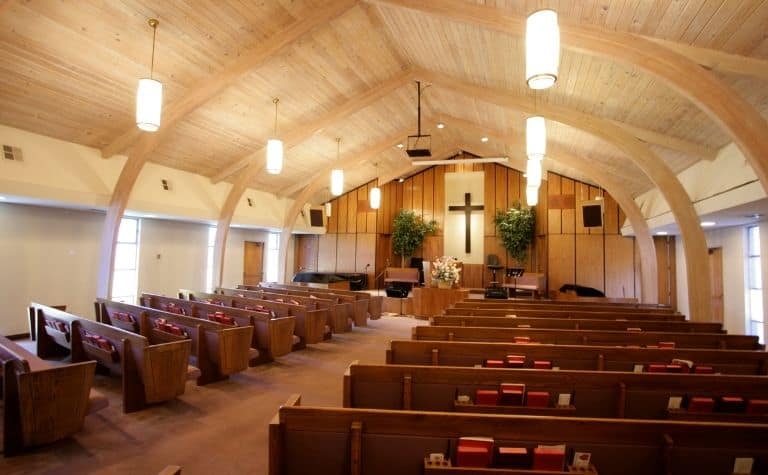Baptist or Methodist? Lutheran or Presbyterian? Assemblies of God or Episcopalian? Because there are so many Christian denominations to choose from today — some studies say there are over 300 — it can be difficult for a person to know which one is right for them. The aim of this article isn’t to tell people which denomination to choose but help them think through the factors related to this important decision.
The most important factor in choosing a denomination and a church is if it teaches the Bible without compromise, especially in its proclamation of the gospel of Jesus Christ for the salvation of sinners. Secondary factors some may consider include the location, size, and history of a denomination or church.
What questions should a person ask about a denomination or church’s beliefs? What about a church’s ministries – why are they important? There are also other factors to consider, even if they aren’t primary. Keep reading to learn more.
Also, see the Largest Christian Denominations: Top 100 to learn more.

Choosing a Denomination Based on Its Beliefs
At its core, Christianity is a set of beliefs about God, people, and the universe that are expressed through faith in Jesus Christ, relationships with other people, and certain ways of behaving that conforms to God’s nature and character. (Also see Which Version of the Bible Do Different Denominations Use?)
Though Christianity is rooted in historical events like the creation of the universe and the death and resurrection of Christ, the Bible teaches that faith is necessary to please God. “And without faith it is impossible to please him, for whoever would draw near to God must believe that he exists and that he rewards those who seek him” (Heb. 11:6, ESV).
What a person believes matters greatly in Christianity. The two greatest commandments according to Christ (e.g., Mark 12:28-34) are to love God and love other people. (Also see Do All Denominations Believe in the Ten Commandments?)
Yet that way of life is made up of activities like prayer, worship, Bible reading, church attendance, acts of service, generosity, and more, which are encased within a certain set of beliefs. The official description and explanation of beliefs are called doctrines. These doctrines are critically important:
- The doctrine of God. The doctrine of God is central and non-negotiable for Christians. The Bible teaches that God is a Trinity: Father, Son, and Holy Spirit. It also teaches that the Son became a man in the person of Jesus of Nazareth, lived a sinless life, and died on a cross for sin. Three days later, he physically rose from the dead. Denominations that don’t teach these doctrines of God and Christ aren’t Christian.
- The doctrine of the Bible. Beliefs about the Bible are also critically important to followers of Christ. All Christian beliefs are rooted in Scripture’s teachings, so people are wise to choose a denomination that believes the Bible is the Word of God, teaches and preaches its passages and verses, and where people strive to apply it to their lives. Denominations that don’t promote the teachings of the Bible should be avoided.
- The doctrine of salvation. Another primary belief for Christians is salvation. Protestant Christianity has traditionally taught that people are saved by God’s grace through faith in Christ (as opposed to works) and in Christ alone. Some believe that certain denominations and churches have neglected this teaching in recent decades. However, there are others that still value, proclaim, and defend the Bible’s teachings on how sinners are saved.
The best denominations and churches champion, proclaim, defend, teach, and live according to the Bible’s teaching. (Also see Can a Christian Change Denominations or Is It a Sin?)
Other Doctrines to Consider Like Baptism and the Lord’s Supper
Beliefs about God, including Christ, the Bible, and salvation are key factors in choosing a denomination. Besides these foundational doctrines, some people may consider other beliefs as well, like,
- Baptism in water: infant baptism or adult baptism?
- Baptism in the Holy Spirit and speaking in tongues: is speaking in tongues for believers today or just in the first century?
- The end times: Amillennial, Premillennial, or Postmillennial?
- The role of women in the household and in ministry
- Calvinism, Arminianism, or something else?
- The Lord’s Supper or communion: is it a memorial or something more?
- Creation or evolution?
Also, see Do All Christian Denominations Baptize People?

What Ministries Does a Denomination or Church Have?
The ministries that a denomination establishes and supports aren’t as important as its beliefs, but they are valuable considerations for two reasons:
- They show, in part, how the church will serve you
- They show, in part, the opportunities you will have to serve the church
How will the church serve you? Some churches have ministries intended for certain people with common needs, like ministries for divorced people, singles, widows, seniors, men, women, youth, and more.
Smaller churches that may not have such ministries can still sufficiently support a variety of people because their clergy, and other leaders, are able to devote more time and attention to each member.
Some who have certain challenges, like debt or a history of addiction, may want to consider a church that has ministries that provide strong assistance in those areas, like in the form of Financial Peace University or Celebrate Recovery.
How will you serve the church? The Bible teaches that every Christian has a spiritual gift. This helps them know they can effectively serve others. A person with the gift of administration may serve well as an elder or trustee. A person with the gift of encouragement may serve well in visiting with seniors.
Some people may sing or play an instrument that would help others worship God. Others may have the gift of teaching, which would help others learn the Bible.
“As each has received a gift, use it to serve one another, as good stewards of God’s varied grace: whoever speaks, as one who speaks oracles of God; whoever serves, as one who serves by the strength that God supplies—in order that in everything God may be glorified through Jesus Christ. To him belong glory and dominion forever and ever. Amen.” (1 Peter 4:10-11, ESV)
Also, see What is the United Church of Christ? to learn more.
Choosing a Denomination: Missions, Money, and Music
Other factors to consider when choosing a denomination are missions, money, and music. These aspects sometimes vary by denomination, but they can also vary by churches within the same denomination. For example,
- One Baptist church may sing out of a hymnal, while another uses a worship band and projects lyrics on a large screen.
- One Lutheran church may have an outreach ministry in Haiti, while another may have one in Indonesia.
- One Presbyterian church may devote a large portion of its budget to a K-12 school that is a ministry of the church, while another one may devote a sizable part of its budget to a homeless shelter.
Missions: Christ mandated that Christians and churches preach the gospel to the lost (e.g., Matt. 28:19-20). This can occur within the walls of a local church when the gospel is preached to unbelievers who are visiting, but it’s also important to take the gospel to the lost in their local area and around the world.
This may include the church sending members for short-term mission trips and providing prayer and financial support for full-time missionaries.
- Also, see What Denominations Are Arminian?
- Also, see What Denominations Are Calvinist?
Money: How transparent is a denomination or church with how they use the money they receive through tithes and offerings? How open is the leadership to questions and suggestions about their spending and saving? How are decisions about spending, savings, giving, and debt decided? What priorities does their budget reveal?
Some denominations and churches opt to make private certain line items, like a pastor’s salary, yet it’s important that the majority of the budget is clear and sensible.
Music: How a church worships through music is important to a lot of people. Two congregations may each sing a song that praises God for his love. One congregation may sing a song that is centuries old and use an organ for accompaniment.
Another congregation may sing a song that is a year old, with multiple guitars and drums for accompaniment. Some believe one style is more holy than another; others believe styles are a matter of preference.
Either way, many people factor music into their decision about where to attend church. (Also see Evangelical vs. Non-Denominational: What’s the Difference?)
Other Factors to Consider When Choosing a Denomination
- Location: How long are you willing to drive to church? 30 minutes? 15 minutes? If there are multiple options available, would you rather attend an urban, suburban, or rural church?
- Size: Does worshiping God with hundreds of other people at the same time excite you or overwhelm you? Do you like having different worship-service options, including Saturday evening and multiple Sunday morning options?
- History: Which is more appealing to you — being part of a church that has been in existence for a century or longer or being part of a younger, up-and-coming congregation? (Also see Do All Denominations Observe Lent?)
- Politics: Some churches are more involved politically than others. Many people like a church that includes members of both political parties because of the unity it demonstrates to outsiders. It’s important to be cautious about a church whose political views overtake the teaching of Scripture.
- Building: Is the church wheelchair-accessible, if that is a need? Does it have air conditioning if a regulated temperature is necessary for a person’s health?
- Social makeup: When a church is comprised of people of different races, socio-economic statuses, education levels, and other walks of life, it shows that in Christ, all people can be unified. In some locations, a church may be in a homogeneous area and unable to reflect such diversity.
How to Research a Denomination to Learn More about Them
- Visit their website. Denominations, and the churches within them, commonly have an online presence that helps interested people learn more about them. The “About” page sometimes includes a history of the church and information about the pastor.
- Visit the church. Attending a church to learn more about it is nerve-racking for some people, but churches are used to having visitors. Greeters and ushers are good people to ask questions of like, “What do you like about this church?” Some churches have Welcome Desks, which are a great place to get more information and ask questions.
- Social media and Youtube. Besides a website, some churches have a presence on other online platforms. Be careful when assessing a church through online platforms because such mediums can only give people a glimpse of what they are like.
Remember That No Denomination or Church Is Perfect
The Apostle Paul’s letters in the New Testament show that no church, even those that an Apostle planted, is perfect. Denominations aren’t perfect, either.
Please see the related articles below.
References:
[1] Source
[2] Source
[3] Source
Related Articles
Wondering What Denominations Are Calvinist? Here’s the Answer
The teachings of French pastor and theologian John Calvin (1509-1564) have been a significant part of the Protestant branch of the Christian faith for over 500 years. At the beginning of the 21st...
Arminianism, which is often contrasted with Calvinism, has been an influential theological belief system in Protestant Christianity for 500 years, though some aspects of it are much older. Just like...
